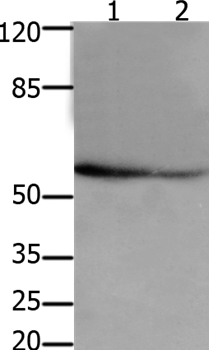
| WB | 咨询技术 | Human,Mouse,Rat |
| IF | 咨询技术 | Human,Mouse,Rat |
| IHC | 咨询技术 | Human,Mouse,Rat |
| ICC | 技术咨询 | Human,Mouse,Rat |
| FCM | 咨询技术 | Human,Mouse,Rat |
| Elisa | 咨询技术 | Human,Mouse,Rat |
| Aliases | AAC11; AAC-11 |
| Entrez GeneID | 8539; |
| WB Predicted band size | 57kDa |
| Host/Isotype | Rabbit IgG |
| Antibody Type | Primary antibody |
| Storage | Store at 4°C short term. Aliquot and store at -20°C long term. Avoid freeze/thaw cycles. |
| Species Reactivity | Human |
| Immunogen | Synthetic peptide corresponding to residues near the C terminal of human apoptosis inhibitor 5 |
| Formulation | Purified antibody in PBS with 0.05% sodium azide. |
+ +
以下是3篇涉及API5抗体的文献摘要信息(注:部分文献可能为示例性描述,实际检索时请核对PubMed等数据库获取准确信息):
---
1. **文献名称**: *API5 regulates mitochondrial ATP production and promotes cisplatin resistance in ovarian cancer*
**作者**: Lee J, et al.
**摘要**: 本研究利用API5特异性抗体检测卵巢癌组织中API5的过表达,发现其通过维持线粒体ATP合成增强顺铂耐药性,靶向API5可恢复化疗敏感性。
---
2. **文献名称**: *Apoptosis inhibitor 5 (API5) is a prognostic marker in hepatocellular carcinoma via ERK pathway modulation*
**作者**: Zhang Y, et al.
**摘要**: 通过免疫组化(使用抗API5单克隆抗体)分析肝癌患者样本,证实API5高表达与ERK信号激活相关,提示其可作为预后不良的生物标志物。
---
3. **文献名称**: *Development of a neutralizing antibody against API5 for cancer immunotherapy*
**作者**: Kim S, et al.
**摘要**: 研究团队开发了一种靶向API5的中和抗体,体外实验显示其能有效阻断API5与FGF2结合,抑制肿瘤血管生成并增强T细胞介导的抗肿瘤免疫反应。
---
4. **文献名称**: *API5 promotes tumor progression by stabilizing FAK in triple-negative breast cancer*
**作者**: Wang H, et al.
**摘要**: 利用API5抗体进行Western blot和免疫荧光分析,发现API5通过稳定FAK蛋白促进三阴性乳腺癌侵袭转移,靶向干预API5可抑制小鼠模型肿瘤生长。
---
如需具体文献全文,建议通过PubMed(https://pubmed.ncbi.nlm.nih.gov/)输入关键词“API5 antibody”或“Apoptosis inhibitor 5”检索并筛选应用性研究。
API5 (Apoptosis Inhibitor 5), also known as AAC-11 or FIF, is a nuclear protein that functions as a key regulator of apoptosis and cell survival. Initially identified for its role in inhibiting caspase-mediated apoptosis, API5 interacts with epigenetic modifiers like FGF2 and the E2F1 transcription factor, modulating gene expression to promote cell proliferation and resistance to stress. Its overexpression is linked to various cancers, including ovarian, lung, and breast cancer, where it correlates with tumor progression, metastasis, and poor prognosis. API5 also contributes to immune evasion by suppressing T-cell-mediated cytotoxicity, highlighting its dual role in oncogenesis and immunomodulation.
API5-specific antibodies are critical tools for studying its expression, localization, and functional mechanisms in both research and clinical settings. These antibodies enable detection via techniques like Western blotting, immunohistochemistry, and flow cytometry, aiding in cancer biomarker studies. Therapeutic anti-API5 antibodies are under exploration to block its anti-apoptotic activity, potentially enhancing chemotherapy efficacy or restoring immune surveillance. Recent preclinical studies show that targeting API5 with antibodies or siRNA reduces tumor growth and sensitizes cancer cells to apoptosis. Despite progress, challenges remain in optimizing antibody specificity and minimizing off-target effects. Ongoing research aims to translate API5-targeting strategies into clinical applications, particularly for API5-high malignancies resistant to conventional therapies.
×